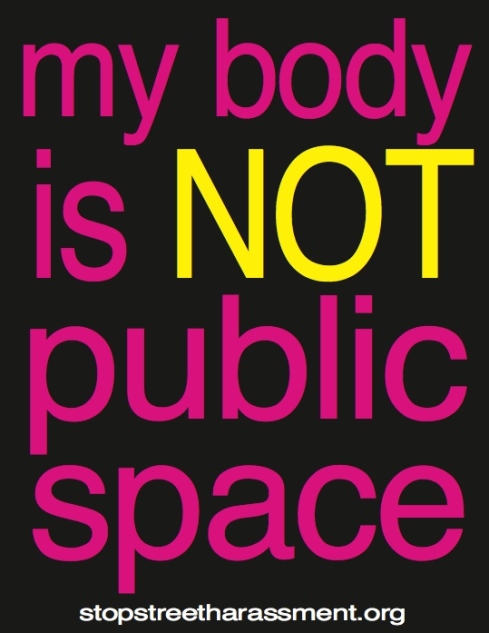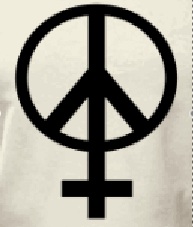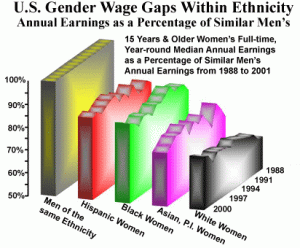 For me, inequality is the biggest issue facing humanity today because it is inequality that is the root cause of so many of the world’s problems. Environmental degradation– inequality in resource distribution and power relations. War- inequality between nations. Poverty and violence- inequality between individuals. I’m sure you’re wondering where socially constructed gender roles come into all this.
For me, inequality is the biggest issue facing humanity today because it is inequality that is the root cause of so many of the world’s problems. Environmental degradation– inequality in resource distribution and power relations. War- inequality between nations. Poverty and violence- inequality between individuals. I’m sure you’re wondering where socially constructed gender roles come into all this.
From the time the sex of a fetus is known, even before it is born, its gender is being socially constructed for it, telling it how a good boy/girl should look, sound, act, and think. This socialization process continues on everyday for the rest of one’s life. Every society and every family have their own ideas as to how a good boy or girl should be, and these ideas are consciously and subconsciously taught to children from the moment they are born.
As soon as a child is birthed in the United States it is wrapped in pink if it’s a girl and blue if it’s a boy so that the whole world has a visual cue of whether or not it’s appropriate to call the baby “tiny and pretty” or “big and strong.” The first question everyone asks when a child is born is, “Is it a boy or a girl?” (totally denying the existence of intersex people) because the answer shapes the entirety of how other people will relate to this tiny human being. And what is a socially acceptable way to relate to people of the same and the opposite sex varies greatly across time and culture. Many, many people have done research and explained this phenomena much better than I can with this post.
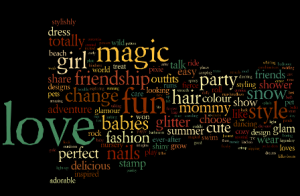 Now, I know some readers are thinking “What’s the big deal? Girls like pink, and they like to be called pretty. Boys are supposed to be strong.” This is where the fault lies. Yes, there are biological differences between the sexes, I am not denying that, but to demand that on the basis of external genitalia one child play with trucks and one with dolls is like trying to push a rabbit through a key hole– you may eventually succeed but it will be messy and not without serious injury.
Now, I know some readers are thinking “What’s the big deal? Girls like pink, and they like to be called pretty. Boys are supposed to be strong.” This is where the fault lies. Yes, there are biological differences between the sexes, I am not denying that, but to demand that on the basis of external genitalia one child play with trucks and one with dolls is like trying to push a rabbit through a key hole– you may eventually succeed but it will be messy and not without serious injury.
This separation of the genders, the dichotomy of man/woman, is dangerous and illogical, for man can only be defined by what he is not: woman, and vice versa. The danger lies in dichotomies themselves for the most basic pairing is good/bad, therefore in any other dichotomy society forms one side will equate to good and one side to bad (masculine/feminine, light/dark, straight/gay etc.).
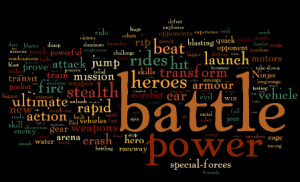 From this we learn as young children that men are rational, strong, and intelligent AND that these are the traits a leader must embody. To contrast, we learn that women are emotional, fragile, and intuitive and that these traits are not suited to leadership. Therefore if a woman wants to become a leader, wants her voice to be respected and heard, she must take on “masculine” traits at great risk to her femininity and marriageability. At the same time if a man embodies the “feminine” qualities of being emotional, fragile and intuitive, he is seen as less than a man and inherently unworthy of respect.
From this we learn as young children that men are rational, strong, and intelligent AND that these are the traits a leader must embody. To contrast, we learn that women are emotional, fragile, and intuitive and that these traits are not suited to leadership. Therefore if a woman wants to become a leader, wants her voice to be respected and heard, she must take on “masculine” traits at great risk to her femininity and marriageability. At the same time if a man embodies the “feminine” qualities of being emotional, fragile and intuitive, he is seen as less than a man and inherently unworthy of respect.
Women in nearly all societies around the world at disadvantaged from the moment they are born simply because the rules have been written to favor males. For a very long time women in the US were relegated to the private sphere, if they had the class privilege, and men were expected to be in the public sphere. Again, the dichotomy here public/private reinforces what is important and what is “personal” and therefore unimportant, respectively.
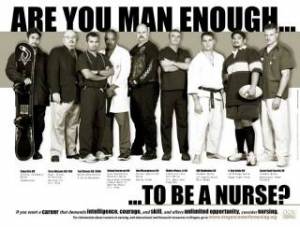 The male norm of reference (ie. when someone says, “Think of a person,” most people think of a man) means that women are expected to be able to physically and emotionally act like men if they are to compete in the public sphere while men who wish to stay home and care for their children, though ridiculed for their choices, are not expected to give up their “masculine” traits. Sports and physical strength is the best example of this. Over and over again in opposition to the idea that men and women should be equal is the statement that men and women are not physically equal. True. Yet, the definition of what physical strength is was written to describe a man! Practically all sports were invented by men and then when women cannot best men at their own game they are considered undeserving of equality???
The male norm of reference (ie. when someone says, “Think of a person,” most people think of a man) means that women are expected to be able to physically and emotionally act like men if they are to compete in the public sphere while men who wish to stay home and care for their children, though ridiculed for their choices, are not expected to give up their “masculine” traits. Sports and physical strength is the best example of this. Over and over again in opposition to the idea that men and women should be equal is the statement that men and women are not physically equal. True. Yet, the definition of what physical strength is was written to describe a man! Practically all sports were invented by men and then when women cannot best men at their own game they are considered undeserving of equality???
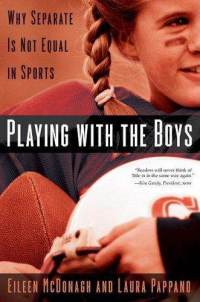 Such strong messages are sent to children from a very early age as “Boys don’t cry” and “Good girls sit with their knees together” are uttered across America. This idea that to be “ladylike” is to take up as little space as possible, while men are encouraged to show their physical abilities by taking up as much space as possible, not only reinforces the sexist public/private dichotomy but also leads to low self-esteem and eating disorders.
Such strong messages are sent to children from a very early age as “Boys don’t cry” and “Good girls sit with their knees together” are uttered across America. This idea that to be “ladylike” is to take up as little space as possible, while men are encouraged to show their physical abilities by taking up as much space as possible, not only reinforces the sexist public/private dichotomy but also leads to low self-esteem and eating disorders.
What we tell children they are, can be and should do has a profound impact on each individual child. If a child grows up being told s/he can do and be whatever s/he wants, that child will usually believe it, whether or not success is to follow. For children who grow up in poverty whose parents don’t have the time, resources or role models to encourage their children to great heights, those children will unfortunately probably continue to live in the cycle of poverty.
The same is true of gender expectations. If a young boy is playing and scrapes his knees he is told to buck up and so, stops crying, at which point some loving adult says “Boys will be boys.” Check that article out for a great POV on how gender roles harm boys too. In many families the same scenario with a daughter would play out quite differently, if a young girl scraped her knees playing she might be chided for being “too tomboyish” while the loving adult in her life will lament that now she won’t look pretty in her Sunday dress.
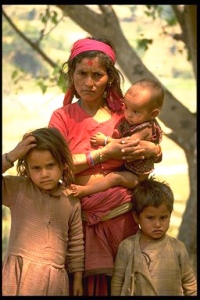 I maintain that this most basic reinforcement of inequality that permeates every single component of our lives, is the basis for and the rationale behind anyone’s ability to perpetuate inequality on any other level. It is no shock that the leaders of most companies that perpetuate environmental degradation and most of the world’s powerful politicians are male, that most violence in the world is carried out by males, and that most of the world’s poor are women. Men (and women) have been taught all their lives that men are better, and to be “good masculine men” they must be physically dominant, stoic, and decisive. It is no surprise these traits carry over into their leadership styles which then impact every aspect of life and maintain inequality.
I maintain that this most basic reinforcement of inequality that permeates every single component of our lives, is the basis for and the rationale behind anyone’s ability to perpetuate inequality on any other level. It is no shock that the leaders of most companies that perpetuate environmental degradation and most of the world’s powerful politicians are male, that most violence in the world is carried out by males, and that most of the world’s poor are women. Men (and women) have been taught all their lives that men are better, and to be “good masculine men” they must be physically dominant, stoic, and decisive. It is no surprise these traits carry over into their leadership styles which then impact every aspect of life and maintain inequality.
This is not to say, in any way, that there are not brave, heroic men and women and intersex people all over the world fighting against inequality. Everyday people risk their lives fighting against environmental degradation, war and poverty, and speak out against violence against women, children, the elderly, the disabled and the LGBTQAI community. (See what I mean about the male norm of reference! If you’re not a young, nondisabled, straight white male you’re the Other.)
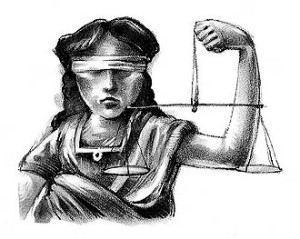
Every fight against injustice and inequality is a good one and worth the fight (as long as its nonviolent… and we’ll get in to strategy in another post) but those hoping for true equality will always fall short of the mark if they do not address the underlying cause of all inequalities: gender inequality caused by socially constructed gender roles. The following quote by Graça Machel, President of the Foundation for Community Development Chair of the GAVI Fund Board, explains this well.
“Without gender equality none of the Millennium Development Goals will be achieved. That is why this report is so valuable. ‘Because I am a Girl’ documents the impact of gender inequality on the lives of girls. It shows clearly and powerfully that our failure to make an equal, more just world has resulted in the most intolerable of situations. In today’s world, to discriminate on the basis of sex and gender is morally indefensible; economically, politically and socially unsupportable.”
 So, by now, I hope you’re salivating wondering how you can help eradicate all forms of inequality from racism to ageism by challenging socially constructed gender roles. It’s easy! All you have to do is speak out when someone makes a blanket statement such as “All women get excited to get their hair done,” or “All men love cars;” buy gender neutral toys for any little ones in your life; equally cite examples of men, women, transgender, intersex, nondisabled, and disabled leaders of all races, ages and classes; support marriage equality; speak out against militarization (more on this in another post); and volunteer with your local women’s organization.
So, by now, I hope you’re salivating wondering how you can help eradicate all forms of inequality from racism to ageism by challenging socially constructed gender roles. It’s easy! All you have to do is speak out when someone makes a blanket statement such as “All women get excited to get their hair done,” or “All men love cars;” buy gender neutral toys for any little ones in your life; equally cite examples of men, women, transgender, intersex, nondisabled, and disabled leaders of all races, ages and classes; support marriage equality; speak out against militarization (more on this in another post); and volunteer with your local women’s organization.
Ok, you don’t have to do all of it. But if you did, you would be amazing, and would be rapidly contributing to worldwide equality. The biggest, and easiest thing you can do is to just ask “WHY?” If someone makes a blanket statement, start a conversation about gender roles. If someone challenges your offering of a gift like a deck of cards or marbles with “Why didn’t you get him/her a present that is more masculine/feminine?” they are obviously ungrateful, but it is a good point for you to ask why it is so important to that person that the child be lead in one direction or the other.
I genuinely do not understand the apprehension people have about equality between the sexes, nor do I understand the archaic clinging-to of scripted gender roles. Strength, emotionality, intelligence, intuition, and anything else that can be described as either “masculine” or “feminine” are simply HUMAN traits, and should be treated as such. Henceforth some boys would become strong stoic men and some girls would become passive emotional women but there would also be space in society for strong emotional men, passive emotional men, strong emotional women, and strong stoic women, in addition to space being opened up for intersexed and transgender people.
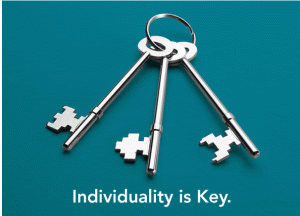 I am not advocating all women disregard their feminine traits or men throw off their masculinities, rather, I want everyone to be free to be who s/he is without coercion from society telling them they are too this or not enough that. The world would not exist without balance, and socially constructed gender roles brazenly defy any balance within an individual because certain qualities have been labeled as being “boys only” or “girls only.” Every single one of us needs to embrace the “feminine” and “masculine” traits within us and not being afraid to flout tradition. (See the article below at pinkisforboys for a great discussion on the problem of naming with respect to “feminine” and “masculine”… the fact that I can’t think of any other way to describe these traits that isn’t gendered is proof of the problem!)
I am not advocating all women disregard their feminine traits or men throw off their masculinities, rather, I want everyone to be free to be who s/he is without coercion from society telling them they are too this or not enough that. The world would not exist without balance, and socially constructed gender roles brazenly defy any balance within an individual because certain qualities have been labeled as being “boys only” or “girls only.” Every single one of us needs to embrace the “feminine” and “masculine” traits within us and not being afraid to flout tradition. (See the article below at pinkisforboys for a great discussion on the problem of naming with respect to “feminine” and “masculine”… the fact that I can’t think of any other way to describe these traits that isn’t gendered is proof of the problem!)
This post has gotten longer than I expected it to be, but I never want to leave you without a complete understanding of where I am coming from in fighting gender inequality. If you have any questions, comments, suggestions, links, or information please join the discussion in the comments. And love one another!
 Today marks the 5th anniversary of Feminist Activism’s first blog post! To celebrate I’m counting down my top five favorite posts from throughout the years. They’re not necessarily the posts that have gotten the most views or interactions, but they’re the ones I think have been most poignant. If your top five would be different, tell everyone which posts you’d have preferred in the comments. Thanks for being a part of my life, and for helping make the world a better place for the past half-a-decade, and here’s to 50 more years of Feminist Activism!
Today marks the 5th anniversary of Feminist Activism’s first blog post! To celebrate I’m counting down my top five favorite posts from throughout the years. They’re not necessarily the posts that have gotten the most views or interactions, but they’re the ones I think have been most poignant. If your top five would be different, tell everyone which posts you’d have preferred in the comments. Thanks for being a part of my life, and for helping make the world a better place for the past half-a-decade, and here’s to 50 more years of Feminist Activism!
 4. Religion and Modest Dress
4. Religion and Modest Dress 1. Socially Constructed Gender Roles: The Root of All Evil
1. Socially Constructed Gender Roles: The Root of All Evil
